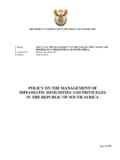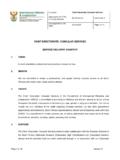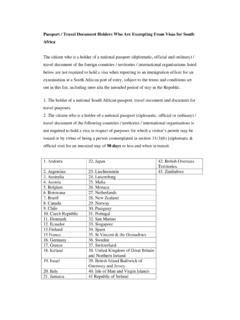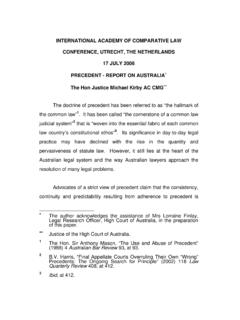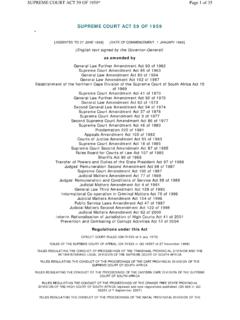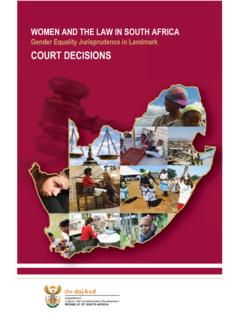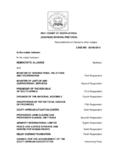Transcription of SOUTH AFRICA'S WITHDRAWAL FROM THE ROME …
1 SOUTH AFRICA'S WITHDRAWAL FROM THE ROME STATUTE OF THE international . criminal court . On 19 October 2O16 Cabinet took the decision that SOUTH Africa will withdraw from the Rome Statute by immediately submitting the lnstrument of WITHDRAWAL to the Secretary- General of the United Nations. ln accordance with Article 127 of the Rome Statute regarding WITHDRAWAL , "A State Party may, by written notification addressed to the Secretary-General of the United Nations, withdraw from this Statute. The WITHDRAWAL shall take effect one year after the date of receipt of the notification, unless the notification specifies a later date", SOUTH AFRICA'S WITHDRAWAL will accordingly be effective after one year.
2 SOUTH Africa is committed to the protection of human rights and the fight against impunity which commitment was forged in the struggle for liberation against the inhumanity of colonialism and apartheid. We condemn in the strongest terms human rights violations and international crimes wherever they may occur and we call for the accountability of those responsible. This commitment is reflected in the significant role that SOUTH Africa played in the international negotiations on the establishment of the lnternational criminal court ('the lCC") and was one of the first signatories to the Rome Statute. The Rome Statute was enacted in SOUTH Africa with the adoption of the lmplementation of the Rome Statute of the lnternational criminal court Act, No.
3 27 of 20O2, thus reaffirming SOUTH AFRICA'S commitment to a system of international justice. SOUTH Africa is also a proud member of the African Union that was established in 2001 with its strong focus on promoting human security, peace and stability on the continent and codifying in its Constitutive Act the principle of humanitarian intervention against war crimes, genocide and crimes against humanity. SOUTH Africa does not view the ICC in isolation, but as an important element in a new system of international justice, law and governance and in the context of the need for the fundamental reform of the system of global governance. SOUTH Africa, from its own experience has always expressed the view that to keep peace one must first make peace.
4 SOUTH Africa is involved in international peacekeeping missions in Africa and is diplomatically involved in inter-related peace processes on a bilateral basis as well as part of AU mandates. ln complex and multi-faceted peace negotiations and sensitive post-conflict situations, peace and justice must be viewed as complementary and not mutually exclusive. The reality is that in an imperfect world we cannot apply international law in an idealistic view that strives for justice and accountability and thus competing with the immediate objectives peace, security and stability. ln 2015, SOUTH Africa found itself in the unenviable position where it was faced with conflicting international law obligations which had to be interpreted within the realm of hard diplomatic realities and overlapping mandates when SOUTH Africa hosted the 30th Ordinary Session of the Permanent Representatives Committee, the 27th Ordinary Session of the Executive Council and the 25th Ordinary Session of the Assembly of the African Union ("the AU Summit"), from 7 to 15 June 2015.
5 The reality was that the ICC on 4 March 2009 and 12. July 2010, issued two warrants of arrest against Omar Al-Bashir. These warrants of arrest were transmitted to States Parties and members of the United Nations Security Council, for execution. SOUTH Africa was one of the countries to which a request for arrest and surrender was transmitted. Thus, SOUTH Africa was faced with the conflicting obligation to arrest President Al-Bashir under the Rome Statute, the obligation to the AU to grant immunity in terms of the Host Agreement and the General Convention on the Privileges and lmmunities of the Organization of African Unity of 1965, as well as the obligation under customary international law which recognizes the immunity of sitting heads of state.
6 Furthermore, there is no clarity on the nature and scope of the provisions on the immunities of Heads of State in terms of customary law and of the Rome Statute. Article 27 and Article 98 of the Rome Statute represent the intersection of the law on immunities applying to Heads of State and Government, and the cooperation obligation of States Parties to the Rome Statute. This lack of clarity is reflected by the inconsistencies in the findings of the Pre-Trail Chambers of the ICC in the Malawi and Chad cases, on the one hand, and the DRC case on the other hand. The relationship between State Parties and non-State Parties such as Sudan, continue to be governed by customary international law that bestows on a Head of State immunity ratione personae and not by the Rome Statute.
7 Arrest of such a person by a State Party pursuant to its Rome Statute obligations, may therefore result in a violation of its customary international law obligations. ln order to address this untenable position, SOUTH Africa, prior to the AU Summit, used the mechanism of consultation available under Article 97 of the Rome Statute, the first State Party ever to do so. The reason for using this mechanism was in order to engage the ICC by explaining the difficulty faced by SOUTH Africa in this instance. However, this was to no avail. Although there are no procedures to guide Article 97. consultations, SOUTH Africa is disappointed that the process, that in our view should clearly have been a diplomatic process, but was turned into a judicial process.
8 As a result of the lack of clarity in the Rome Statute and in the Rules of Procedure and Evidence, the experience with the ICC left SOUTH Africa with the sense that its fundamental right to be heard was violated. Under these circumstances SOUTH Africa is of the view that to continue to be a State Party to the Rome Statute will not be helpful to achieve its foreign policy objectives for the following reasons: It will compromise SOUTH AFRICA'S efforts to promote peace and security on the African Continent and to play an essential part in international peacekeeping missions in Africa and in related peace processes;. SOUTH Africa will have the necessary legislative measures for it to continue to have jurisdiction over the crimes of genocide, war crimes and crimes against humanity in order that there is no immunity for these crimes.
9 There is an urgent need to assess whether the ICC is still reflective of the principles and values which guided its creation and its envisaged role as set out in the Rome Statute. The credibility and acceptability of the ICC to become the universally accepted institution for justice that will ensure the ideal of universality and equality before the law that was the expectation of SOUTH Africa when it became a State Party, has not been realized and is under threat;. For as long as three of the five permanent members of the Security Council are not State Parties to the Statute the credibility of the ICC will be questioned and universality will not be achieved.
10 Furthermore, given this observation, the legitimacy of the referrals by the UNSC is highly controversial. The Security Council has also not played its part in terms of Article 16 of the Rome Statute where the involvement of the ICC will pose a threat to peace and security on the African continent; and There are perceptions of inequality and unfairness in the practice of the ICC that do not only emanate from the court 's relationship with the Security Council, but also by the perceived focus of the ICC on African states, notwithstanding clear evidence of violations by others. ln withdrawing from the lCC, SOUTH Africa wishes to reiterate its commitment to human rights and the fight against impunity.
